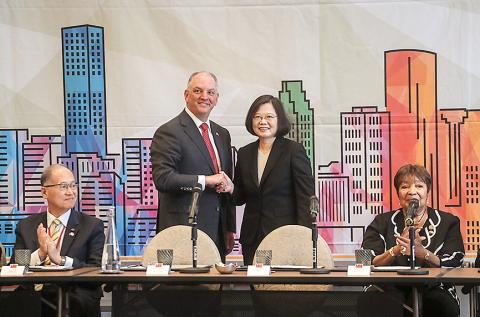President Tsai Ing-wen (蔡英文) on Sunday expressed the hope that Taiwan and the US can work together to defend the free-market economy.
The president made the remarks at a Taiwan-US business forum in Houston, Texas, which was attended by Louisiana Governor John Bel Edwards and US Representative Eddie Bernice Johnson.
Taiwan and the US have spared no efforts to consolidate the free-market economy, protect enterprises by ensuring fair competition and safeguard businesses from political interference, Tsai told the forum, describing the efforts as the foundation of economic development in the two nations.

Photo: CNA
She expressed the hope that Taiwan can continue to defend the foundation along with the US.
Tsai’s remarks came after China increased its efforts to block Taiwan’s presence on the international stage, such as demanding that international airlines and hotel groups change Taiwan’s designation on their Web sites.
Edwards told the forum that Louisiana has signed an agreement with Taiwan on the mutual recognition of each other’s driver’s licenses, making it the 27th US state to do so.
The forum was also attended by National Security Council Secretary-General David Lee (李大維), Minister of Foreign Affairs Joseph Wu (吳釗燮) and Vice Minister of Economic Affairs Wang Mei-hua (王美花).
After the forum, Tsai visited the Texas Medical Center’s (TMC) Innovation Institute, where she was briefed by TMC chief executive officer and executive vice president Shawn Cloonan and director Erik Halvorsen.
Tsai’s visit to the world’s largest medical complex was aimed at learning how an innovative industrial cluster can be established and developed, and she would take the institute as reference for similar applications in Taiwan, Presidential Office spokesman Alex Huang (黃重諺) said.
Tsai arrived in Houston on Saturday for a 27-hour stopover on her way home after concluding state visits to Belize and Paraguay, two of Taiwan’s 18 diplomatic allies.
She was scheduled to arrive in Taipei last night.
The New York Times in an article on Sunday said Tsai’s two transits stops in the US was a sign of efforts to deepen relations between Taipei and Washington.
The visits to Houston and Los Angeles are considered “transit stops” rather than official visits, part of a long-standing restriction imposed by the US to maintain better relations with China.
However, Beijing has objected even to such brief stopovers, and the most recent ones came after US President Donald Trump demonstrated willingness to provoke China’s anger, it said.
Bonnie Glaser, a senior adviser for Asia at the Center for Strategic and International Studies, a non-profit policy research organization, was cited in the article as saying that the Trump administration’s approval of Tsai’s visits to the Reagan Library and the Johnson Space Center in Houston showed that “they trusted she would not say or do anything that would increase cross-strait tensions.”
Former American Institute in Taiwan director William Stanton said the Trump administration should retaliate in kind if Beijing fines US companies or restricts their access to the Chinese market for refusing to designate Taiwan as part of China.
“China’s trying to make both Taiwan and the government of Tsai Ing-wen persona non grata throughout the world,” Stanton said. “There’s just no end to it.”

MAKING WAVES: China’s maritime militia could become a nontraditional threat in war, clogging up shipping lanes to prevent US or Japanese intervention, a report said About 1,900 Chinese ships flying flags of convenience and fishing vessels that participated in China’s military exercises around Taiwan last month and in January last year have been listed for monitoring, Coast Guard Administration (CGA) Deputy Director-General Hsieh Ching-chin (謝慶欽) said yesterday. Following amendments to the Commercial Port Act (商港法) and the Law of Ships (船舶法) last month, the CGA can designate possible berthing areas or deny ports of call for vessels suspected of loitering around areas where undersea cables can be accessed, Oceans Affairs Council Minister Kuan Bi-ling (管碧玲) said. The list of suspected ships, originally 300, had risen to about

DAREDEVIL: Honnold said it had always been a dream of his to climb Taipei 101, while a Netflix producer said the skyscraper was ‘a real icon of this country’ US climber Alex Honnold yesterday took on Taiwan’s tallest building, becoming the first person to scale Taipei 101 without a rope, harness or safety net. Hundreds of spectators gathered at the base of the 101-story skyscraper to watch Honnold, 40, embark on his daredevil feat, which was also broadcast live on Netflix. Dressed in a red T-shirt and yellow custom-made climbing shoes, Honnold swiftly moved up the southeast face of the glass and steel building. At one point, he stepped onto a platform midway up to wave down at fans and onlookers who were taking photos. People watching from inside

Japan’s strategic alliance with the US would collapse if Tokyo were to turn away from a conflict in Taiwan, Japanese Prime Minister Sanae Takaichi said yesterday, but distanced herself from previous comments that suggested a possible military response in such an event. Takaichi expressed her latest views on a nationally broadcast TV program late on Monday, where an opposition party leader criticized her for igniting tensions with China with the earlier remarks. Ties between Japan and China have sunk to the worst level in years after Takaichi said in November that a hypothetical Chinese attack on Taiwan could bring about a Japanese

The WHO ignored early COVID-19 warnings from Taiwan, US Deputy Secretary of Health and Human Services Jim O’Neill said on Friday, as part of justification for Washington withdrawing from the global health body. US Secretary of State Marco Rubio on Thursday said that the US was pulling out of the UN agency, as it failed to fulfill its responsibilities during the COVID-19 pandemic. The WHO “ignored early COVID warnings from Taiwan in 2019 by pretending Taiwan did not exist, O’Neill wrote on X on Friday, Taiwan time. “It ignored rigorous science and promoted lockdowns.” The US will “continue international coordination on infectious